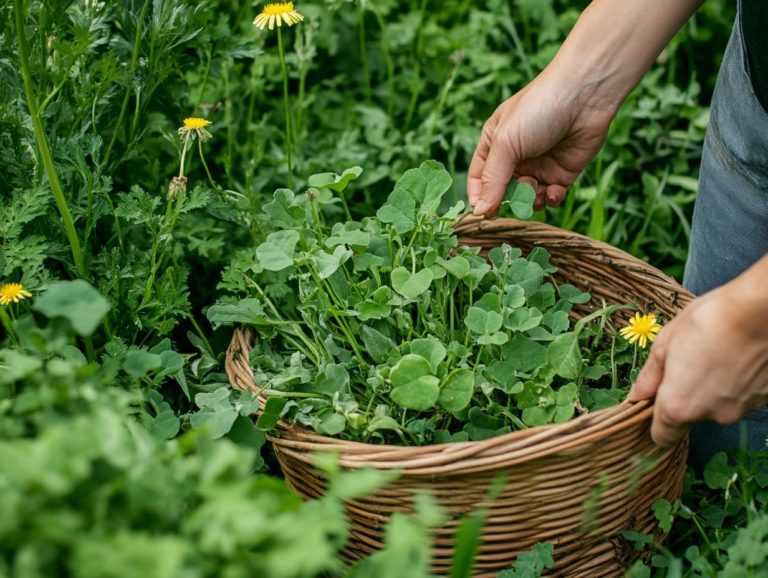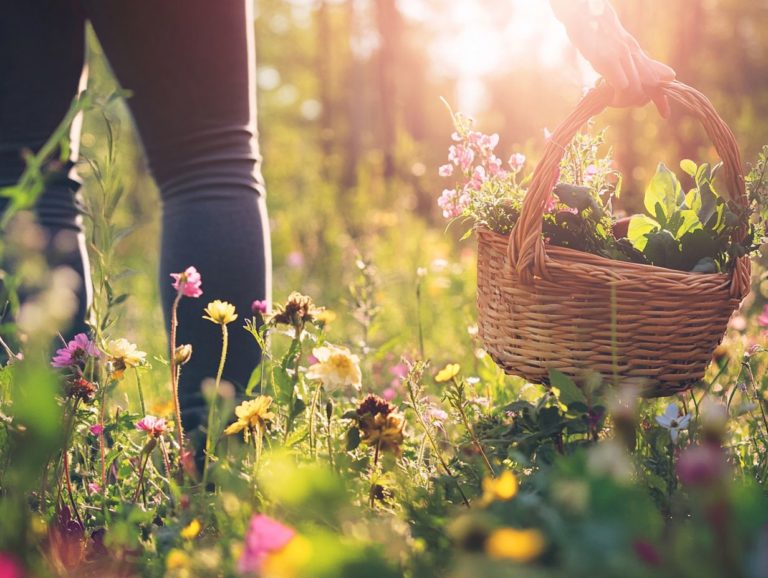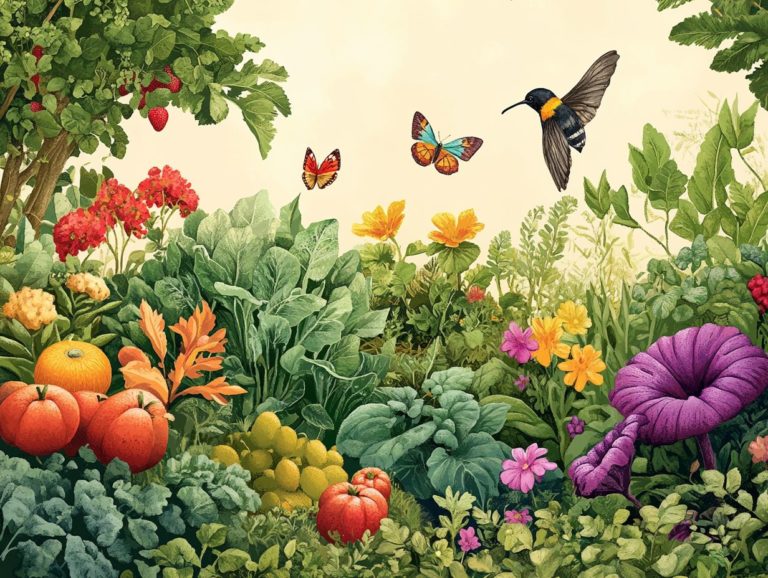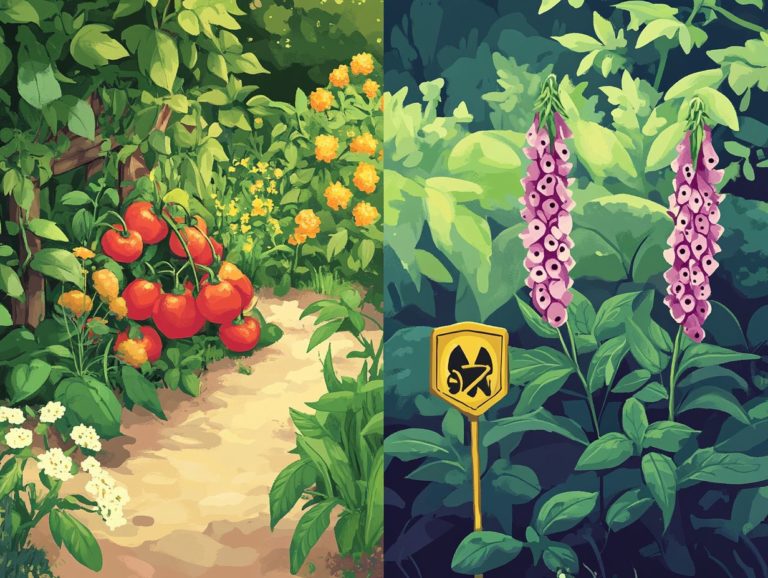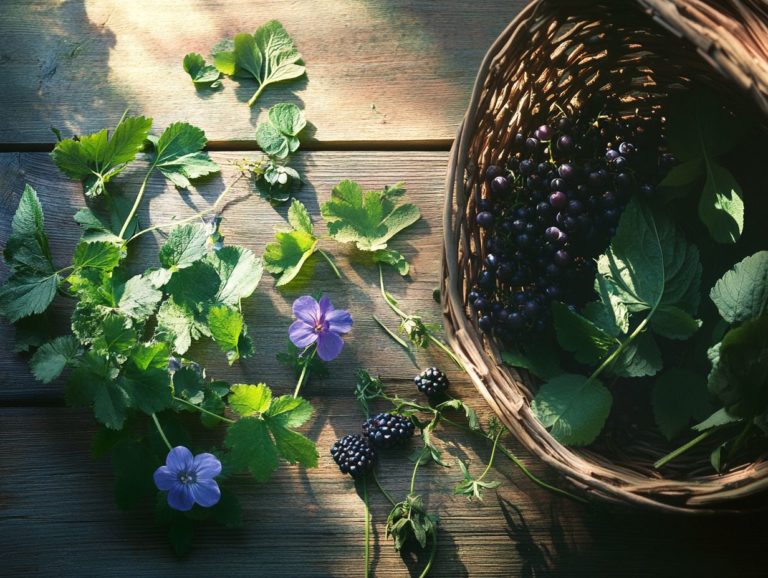The Role of Edible Plants in Sustainable Living
Ready to transform your life and the planet? Dive into the world of edible plants!
Edible plants play an essential role in sustainable living, providing a multitude of environmental and nutritional benefits. By incorporating these plants into your daily life, you can significantly reduce your carbon footprint while enhancing your diet making the experience both rewarding and enjoyable.
This article delves into the art of growing and foraging for edible plants, offers delectable recipes, and tackles the common challenges you may face on this journey. Embark on a discovery of the transformative power of edible plants and how they can help you cultivate a more sustainable lifestyle.
Contents
- Key Takeaways:
- What are Edible Plants?
- The Benefits of Incorporating Edible Plants in Sustainable Living
- How to Incorporate Edible Plants in Your Sustainable Lifestyle
- Common Edible Plants and How to Use Them
- Challenges and Solutions for Incorporating Edible Plants in Sustainable Living
- Frequently Asked Questions
- What is the role of edible plants in sustainable living?
- How do edible plants contribute to reducing food waste?
- What are some examples of edible plants that can be grown sustainably?
- How do edible plants contribute to a healthier lifestyle?
- Can edible plants be incorporated into urban living?
- What are some tips for incorporating edible plants into a sustainable lifestyle?
Key Takeaways:
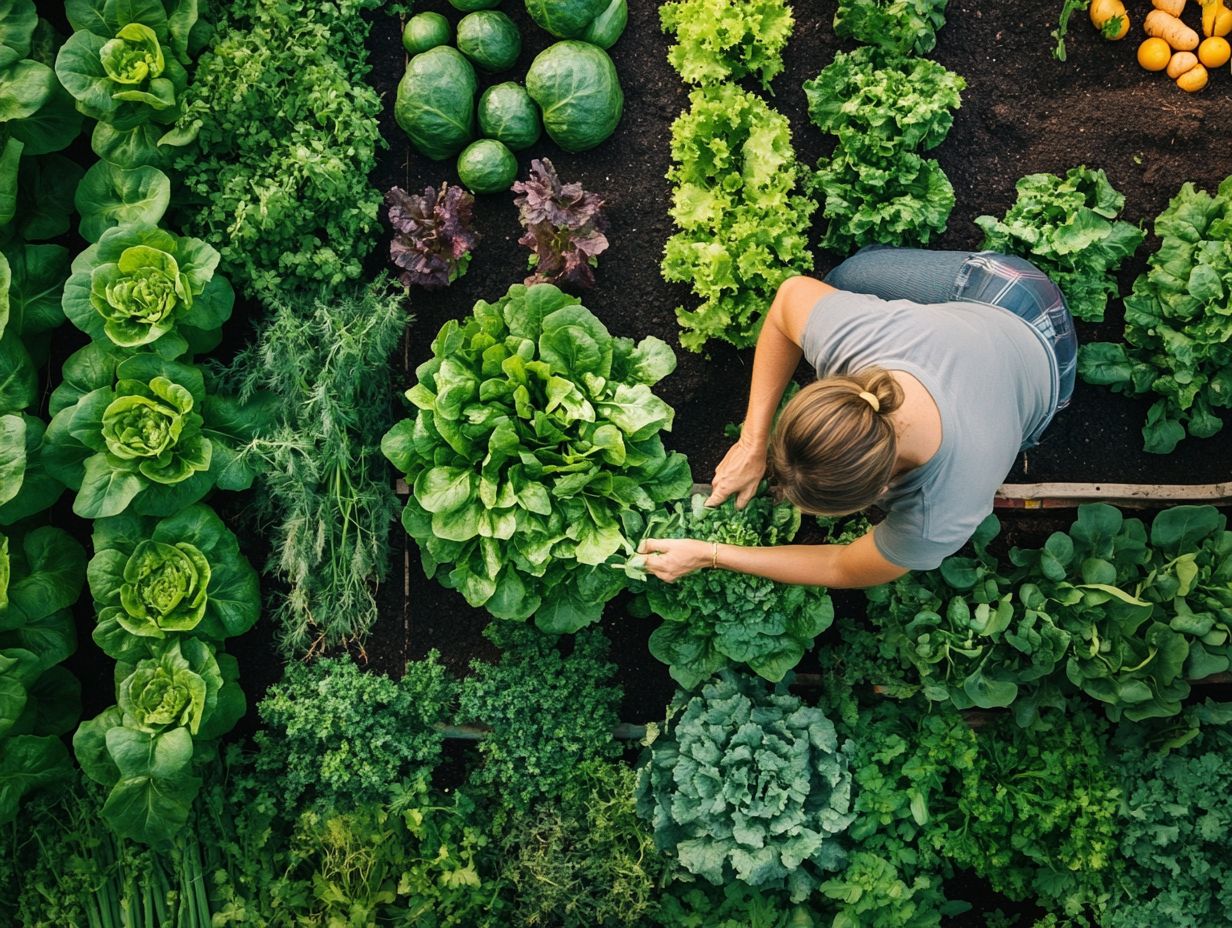
- Incorporating edible plants provides environmental and nutritional benefits.
- Consistently growing and foraging for these plants enhances your sustainable lifestyle.
- Educate yourself on edible plants and their uses to overcome challenges effectively.
What are Edible Plants?
Edible plants are a delightful assortment of flora that are safe to consume. This includes a wide variety of fruits, vegetables, herbs, and even wild edibles. These plants support sustainable agriculture, playing a significant role in food sovereignty, local food systems, and the variety of plant and animal life.
They offer nutrient-dense food that can truly enhance your health and well-being. Whether you re enjoying home-grown produce or foraging for wild varieties, edible plants are pivotal in your journey toward sustainable living and environmental stewardship.
The Benefits of Incorporating Edible Plants in Sustainable Living
Incorporating edible plants into your diet promotes sustainable living by boosting food production and cutting down on carbon emissions, helping to combat climate change. This approach boosts local food distribution and gets you more connected to your community! It also reduces your reliance on fossil fuels, synthetic fertilizers, and monoculture crops, which can negatively impact soil quality and local ecosystems.
Growing your own food isn’t just rewarding; it also brings significant health benefits while providing valuable educational opportunities for individuals and communities alike.
Environmental Benefits
Incorporating edible plants into your gardens and diets offers remarkable environmental benefits. These plants help with carbon sequestration the process of capturing and storing carbon dioxide and boost biodiversity in local ecosystems. By opting for diverse crops rather than sticking to monocultures, you can significantly lower carbon emissions and improve soil quality, resulting in more resilient agricultural systems.
Engaging in practices like crop rotation and community composting is crucial for maintaining soil fertility. These methods minimize reliance on chemical fertilizers that can damage the environment. Crop rotation disrupts the cycles of pests and diseases, while community composting turns organic waste into a valuable resource for your gardens, helping to reduce landfill contributions.
By promoting a rich variety of plant species, these strategies not only enhance food security but also fortify local food systems. Start incorporating edible plants today to make a real difference! Together, they provide sustainable solutions to mitigate the impacts of climate change, ensuring ecosystems flourish and adapt to future challenges.
Nutritional Benefits
Adding edible plants to your diet offers great nutritional benefits. These foods are packed with essential nutrients for a balanced, plant-based lifestyle. When grown organically, they nourish your body while providing additional health advantages, such as reducing the risk of long-term illnesses and promoting overall well-being.
Consider leafy greens like spinach and kale. They are packed with vitamins A, C, and K, which support robust immune function and radiant skin. Meanwhile, bell peppers and tomatoes deliver powerful antioxidants that fight inflammation and support heart health.
Don t overlook the benefits of herbs like basil and parsley. They can elevate your dishes while supplying important natural compounds that support your health. By embracing organic gardening techniques, you can grow these beneficial plants yourself and foster a sustainable, health-focused lifestyle.
Your dietary choices impact not only your well-being but also promote environmental health through reduced chemical exposure.
How to Incorporate Edible Plants in Your Sustainable Lifestyle
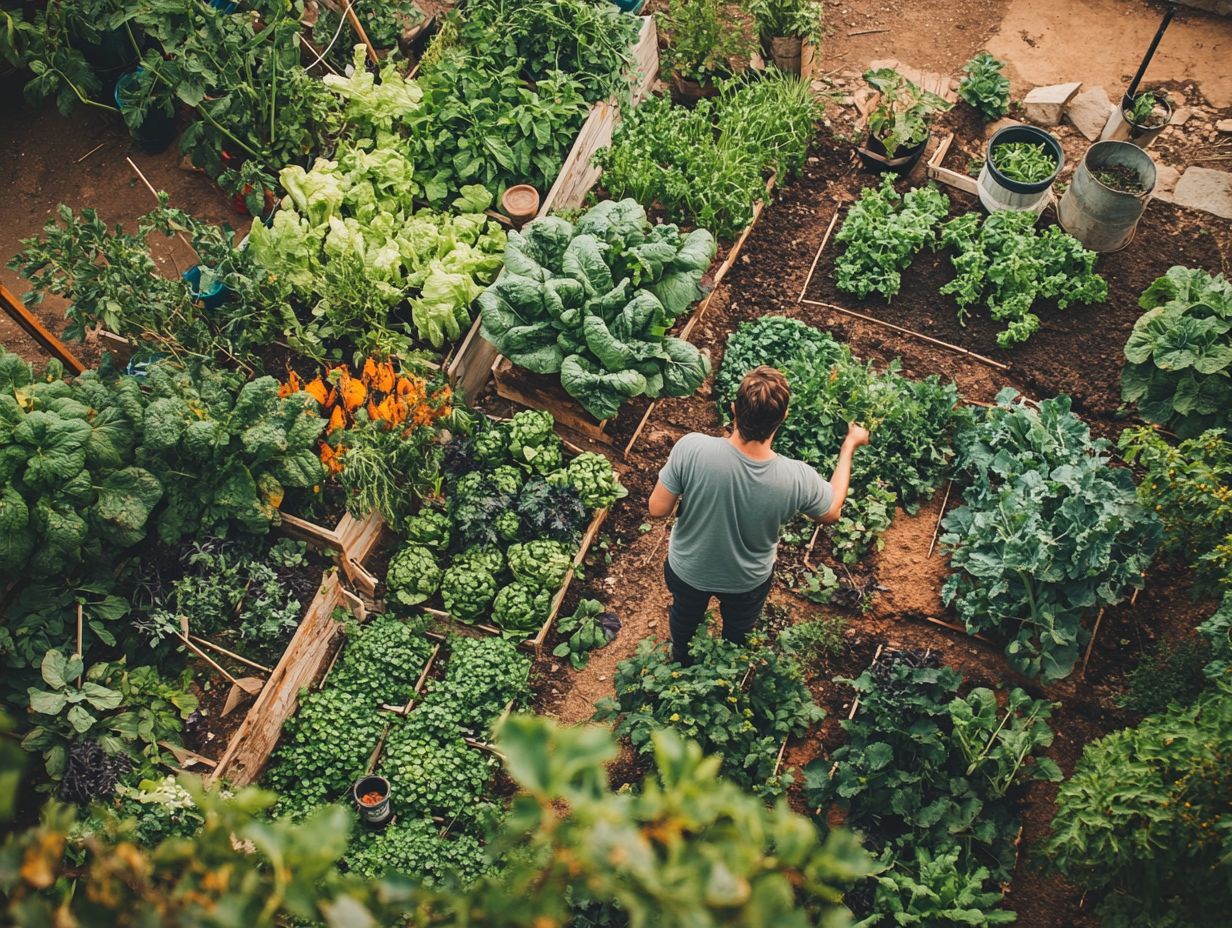
Integrating edible plants into your sustainable lifestyle can be done through various methods. You can establish a home garden or forage for wild edibles. Understanding the role of education in sustainable foraging is crucial, as these practices boost your food security and promote sustainable gardening techniques, allowing you to significantly reduce your carbon footprint while enhancing local food systems.
Growing Your Own Edible Plants
Cultivating your own edible plants in a home garden is an incredibly rewarding experience. Imagine nurturing nutrient-rich soil and enjoying fresh produce straight from your backyard! By embracing organic sources and sustainable gardening practices, you elevate the quality of your gardening efforts.
As you explore planting techniques, methods like companion planting and crop rotation help create a thriving ecosystem that promotes plant health while keeping pests at bay. Focus on soil quality; incorporating organic matter such as compost enhances drainage and fertility. Opting for organic seeds suited to your local climate fosters a healthier garden and encourages biodiversity, a cornerstone of resilient ecosystems.
Mixing various species in your garden protects against disease, transforming your space into not just a source of food but also a sanctuary for beneficial insects and wildlife.
Foraging for Edible Plants
Foraging for wild edible plants offers a unique chance to connect with local ecosystems while sourcing nutrient-dense food directly from nature. This practice enriches biodiversity and encourages sustainable living through community composting and a heightened awareness of your environmental impact.
To understand foraging principles, learn to identify safe, edible plants. It s a rewarding journey for both beginners and seasoned foragers. Recognizing local flora and understanding their roles within the ecosystem is crucial. Practicing sustainable foraging shows respect for nature by ensuring you leave enough plants behind to regenerate, contributing to ecological balance.
Engaging with community members allows you to exchange knowledge and resources, enhancing your understanding of plant identification and ethical foraging practices. Foraging can become a collective endeavor that nourishes your well-being while strengthening community bonds and fostering environmental stewardship.
Common Edible Plants and How to Use Them
Common edible plants, from well-known herbs to vibrant fruits and vegetables, serve as versatile ingredients that can elevate your meals and enhance your enjoyment of healthy eating.
Mastering the art of incorporating these plants into your recipes allows you to create delicious, nutrient-rich dishes that promote wellness and support sustainability.
Start your journey today! Grow your own edible plants or begin foraging to discover delicious, nutritious foods!
Recipes and Cooking Tips
Creating delightful dishes with common edible plants hinges on your understanding of their flavors, nutritional profiles, and the most effective preparation methods. By emphasizing healthy eating, these recipes empower you to incorporate more fresh produce into your diet while celebrating the rich diversity of plants at your fingertips.
Exploring local farmers’ markets or your own backyard garden opens up a treasure trove of seasonal ingredients. These ingredients not only elevate the taste of your meals but also align with sustainable eating practices. Techniques like blanching, steaming, or saut ing help retain the vibrant colors and essential nutrients of these plants. As you prepare your dishes, consider the natural characteristics of each ingredient and pair them thoughtfully to create harmonious flavors.
From vibrant salads bursting with freshness to hearty soups that showcase the season s finest, you ll find a wealth of possibilities that connect you to nature s bounty.
Challenges and Solutions for Incorporating Edible Plants in Sustainable Living
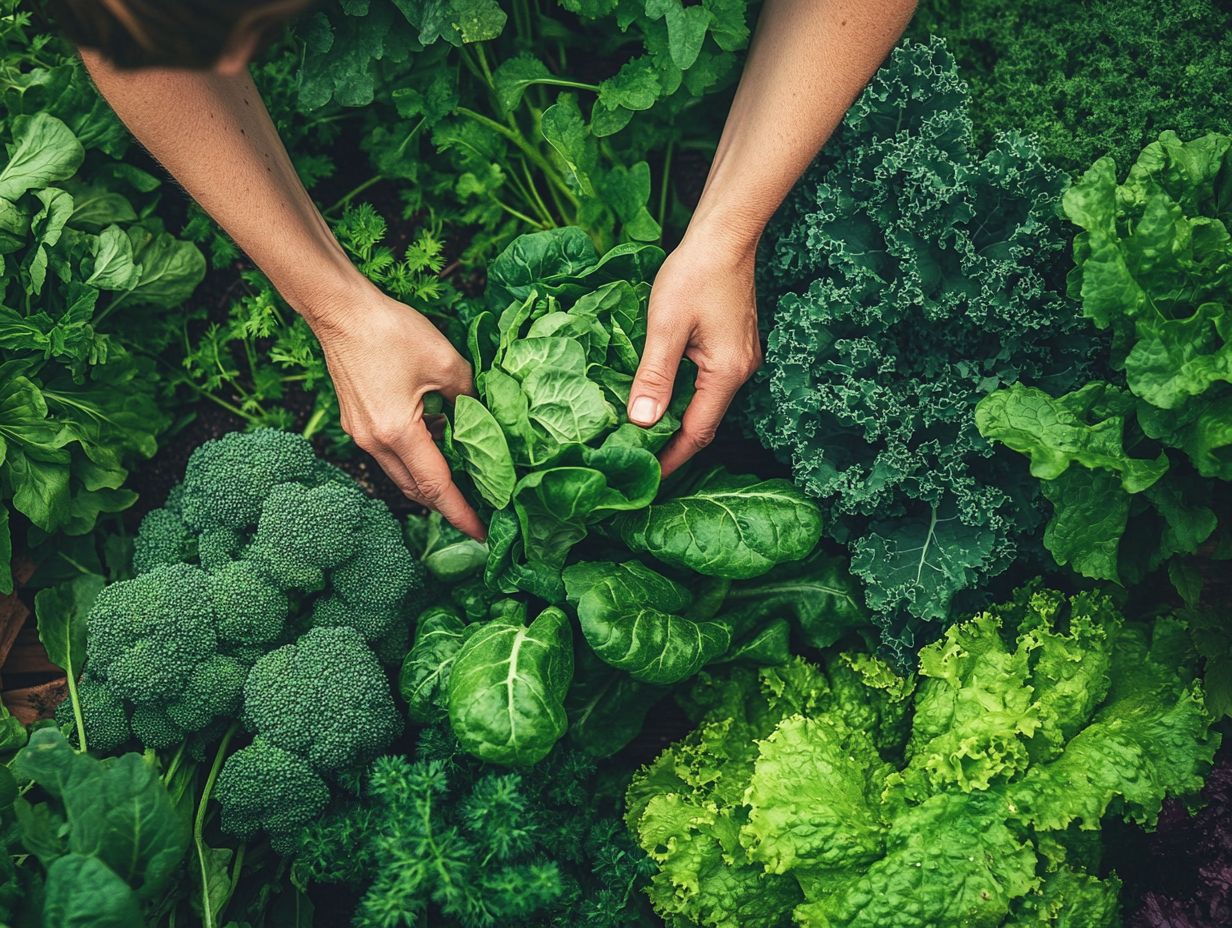
Incorporating edible plants into your sustainable living journey may present unique challenges, including managing food waste and minimizing your carbon footprint. You can tackle these challenges head-on and enjoy the many rewards of growing and eating edible plants!
Overcoming Obstacles
Overcoming obstacles in sustainable gardening is crucial for promoting food security and ensuring the viability of growing edible plants. You may encounter challenges like natural pests or poor soil quality. Effective strategies and sustainable gardening practices can help you tackle these issues directly.
Utilizing natural pest control methods, such as introducing beneficial insects or applying organic deterrents, significantly reduces your reliance on chemical pesticides while nurturing a healthy ecosystem. Improving soil quality through methods like turning kitchen scraps into rich soil and crop rotation not only provides nutrient-rich foundations for your plants but also cultivates a vibrant microbial community.
Planting a variety of species promotes biodiversity and resilience, leading to a more balanced garden that is better equipped to withstand environmental challenges. By integrating these methods, you pave the way toward a sustainable future, ensuring that your gardening efforts yield a bountiful harvest.
Tips for Success
Implementing tips for success in your gardening efforts can enhance your ability to incorporate edible plants into your sustainable living practices. Embrace composting techniques and engage with a community garden to cultivate a supportive environment ripe for growth and learning.
Dedicate time to educate yourself about planting strategies like crop rotation and companion planting to boost your yield. Engaging with local resources, such as cooperative extension services, provides invaluable guidance tailored to your region s unique climate and soil conditions.
Sharing knowledge within community groups fosters a culture of sustainability and encourages collaboration. Organize workshops focused on effective composting methods, transforming kitchen scraps into nutrient-rich fertilizers.
By adopting these practices, you nurture your own green spaces and contribute to a broader movement toward environmental responsibility.
Frequently Asked Questions
What is the role of edible plants in sustainable living?
Edible plants play a crucial role in sustainable living by providing a nutritious and environmentally-friendly food source. For those interested in foraging, exploring the top 10 edible plants to harvest sustainably can enhance your knowledge. They can be grown in various spaces and do not require excessive amounts of water or energy to produce.
How do edible plants contribute to reducing food waste?
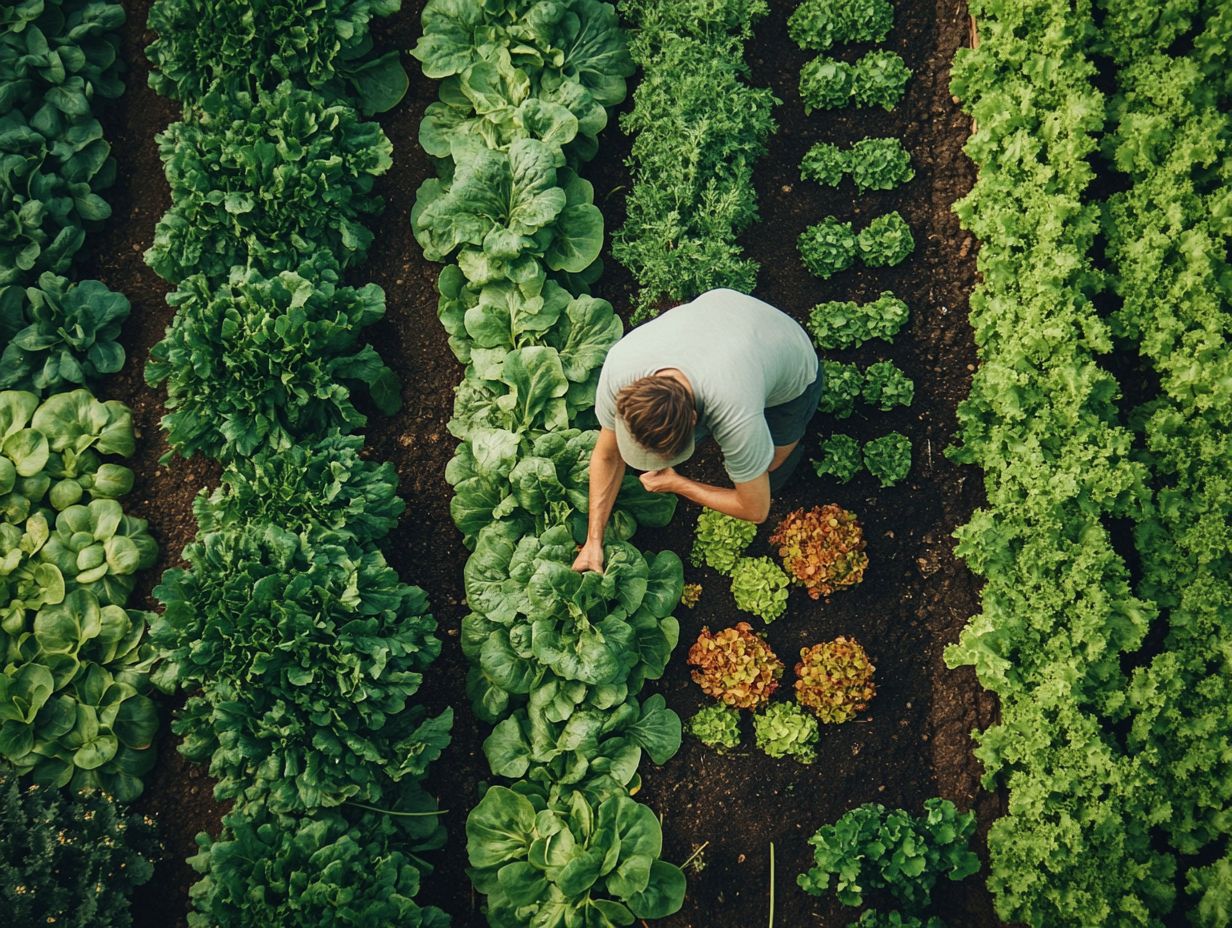
Growing our own edible plants gives us control over our food supply. We can harvest only what we need and use all parts of the plant, minimizing waste!
What are some examples of edible plants that can be grown sustainably?
Examples include tomatoes, lettuce, kale, strawberries, and basil, depending on your climate and growing conditions.
How do edible plants contribute to a healthier lifestyle?
Growing and consuming edible plants can lead to a healthier lifestyle. They are typically free from harmful chemicals used in farming and can provide essential vitamins and minerals.
Plus, being involved in the growing process is a great way to get physical activity!
Can edible plants be incorporated into urban living?
Don’t miss out! You can easily grow your own edible plants in urban spaces like balconies or rooftops. This makes it accessible for city-dwellers to have their own sustainable food source and contribute to reducing their carbon footprint.
What are some tips for incorporating edible plants into a sustainable lifestyle?
Some tips include using safe fertilizers made from natural materials, composting food scraps, rotating crops, and choosing native plants. It’s also important to harvest and use the plants responsibly to ensure their continued growth and sustainability.

